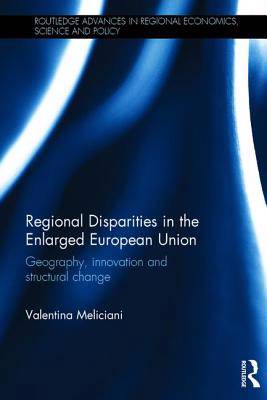
- Retrait gratuit dans votre magasin Club
- 7.000.000 titres dans notre catalogue
- Payer en toute sécurité
- Toujours un magasin près de chez vous
- Retrait gratuit dans votre magasin Club
- 7.000.0000 titres dans notre catalogue
- Payer en toute sécurité
- Toujours un magasin près de chez vous
Regional Disparities in the Enlarged European Union
Geography, innovation and structural change
Valentina MelicianiDescription
The last twenty years have seen an increase in European integration and the emergence of the technological revolution. Although tighter integration coupled with technological innovation should facilitate cross-regional convergence, some European regions have managed to jump ahead while others have been left behind. This book examines the regional characteristics that favour growth and analyses the relevance of innovation, socio-economic and structural factors in shaping regional economic disparities.
In this book, particular attention is devoted to the EU enlargement towards the East, to its consequences on Europe's traditional North-South divide, and to the increasing regional disparities in new member states after the transition. It demonstrates the growing importance of innovation and human capital in explaining the increase in income and employment disparities in old EU members, particularly after the 2008 financial crisis. It also shows that for newcomers, regional disparities are essentially linked to socio-economic factors as capital regions approach Western standards, while others - mainly old industrial regions and peripheral ones - lag behind.
This book integrates theoretical discussion with empirical evidence and will appeal to regional scientists interested in regional inequalities, and to policy makers concerned with devising effective strategies to tackle regional disparities in Europe.
Spécifications
Parties prenantes
- Auteur(s) :
- Editeur:
Contenu
- Nombre de pages :
- 190
- Langue:
- Anglais
- Collection :
Caractéristiques
- EAN:
- 9780415741712
- Date de parution :
- 20-10-15
- Format:
- Livre relié
- Format numérique:
- Genaaid
- Dimensions :
- 156 mm x 234 mm
- Poids :
- 467 g

Les avis
Nous publions uniquement les avis qui respectent les conditions requises. Consultez nos conditions pour les avis.






